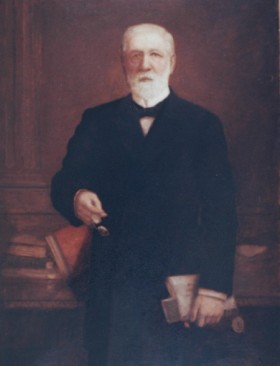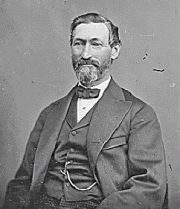James Gillespie Blaine (1830-1893) was a major political force in Maine and the U.S. Congress. A Representative and a Senator from Maine; he was born in West Brownsville, Washington County, Pa., January 31, 1830. He was graduated from Washington College, Washington, Pa., in 1847, taught at the Western Military Institute, Blue Lick Springs, Kentucky. He returned to Pennsylvania, studied law, and taught at the Pennsylvania Institution for the Blind in Philadelphia 1852-1854.
In 1854, Blaine moved to Maine where he edited the Portland Advertiser and the Kennebec Journal newspapers. A member of the Maine House of Representatives (1859-1862), he served the last two years as speaker. Elected as a Republican to the Thirty-eighth and to the six succeeding Congresses, he served from March 4, 1863, to July 10, 1876, when he resigned. In Congress, he was Speaker of the (Forty-first through Forty-third) Congresses, and chairman of the Committee on Rules (Forty-third through Forty-fifth Congresses).
In 1871 he presented a school bell, cast in Boston, to what is now Kents Hill School in Readfield. It is still in use.
An unsuccessful candidate for nomination for President on the Republican ticket in 1876 and 1880, Blaine was appointed and subsequently elected as a Republican to the United States Senate to fill the vacancy caused by the resignation of Lot M. Morrill. He was reelected and served from July 10, 1876, to March 5, 1881, when he resigned to become Secretary of State.
In the Senate he was chairman of the Committee on Civil Service and Retrenchment (Forty-fifth Congress), and a member of the Committee on Rules (Forty-fifth Congress).
He had opposed the Civil War reconstruction plan of Andrew Johnson and in 1867 voted in favor of his impeachment. Johnson escaped conviction in the U.S. Senate by one vote.
In the 1870’s, charges of fraud against the government, corruption, and bribery involving Credit Moblier, the construction company for the Union Pacific Railroad, implicated several prominent political figures, including Blaine. The scandal followed him the remainder of his political career.
After serving briefly as Secretary of State in the Cabinets of Presidents James Garfield and Chester Arthur from March 5 to December 12, 1881, he finally gained the Republican nomination for President in 1884. After a bitter and “unprecedentedly dirty” campaign, Blaine lost his final bid for the top office.
Later Blaine returned as Secretary of State in the Cabinet of President Benjamin Harrison from 1889 to 1892 when he resigned. Blaine aided in organizing, and was the first president of, the Pan American Congress.
Dubbed the “Plumed Knight,” by Robert G. Ingersoll who nominated him for President in 1876, Blaine died in Washington, D.C., January 27, 1893. He was interred in Oak Hill Cemetery and reinterred at the request of the State of Maine in the Blaine Memorial Park, Augusta in June, 1920.
His home in Augusta, the Blaine House, is now the official residence of Maine’s governors.
More Videos!
Additional resources
Balch, William Ralston. An American Career and its Triumph. The life and public services of James G. Blaine, with the facts in the career of John A. Logan. Philadelphia, Pa. Thayer, Merriam & Co. limited. 1884. [University of Maine, Raymond H. Fogler Library, Special Collections]
Blaine, James G. Twenty Years of Congress: From Lincoln to Garfield. 2 vols. Norwich, Connecticut: Henry Bill Publishing Co. 1884-1886.
Hunt, H. Draper. “The ‘Plumed Knight’ at Home: An Intimate Sketch of James G. Blaine.” Maine Historical Society Quarterly. Summer, 1988.
Muzzey, David S. James G. Blaine: A Political Idol of Other Days. 1943. Reprint. Port Washington, New York: Kennikat Press, 1963.
National Archives, Blanie Civil War photo, # NWDNS-111-B-3385.
Russell, Charles Edward. Blaine of Maine; His Life and Times. New York. Cosmopolitan Book Corporation. 1931.
Tutorow, Norman E. James Gillespie Blaine and the Presidency: A Documentary Study and Source Book. New York. P. Lang. c1989. [Maine State Library]



